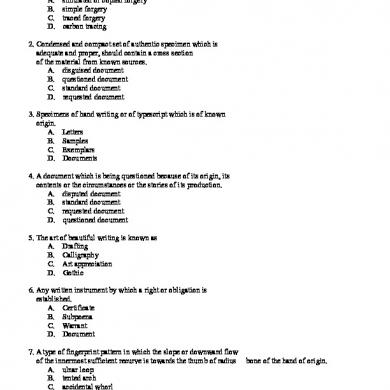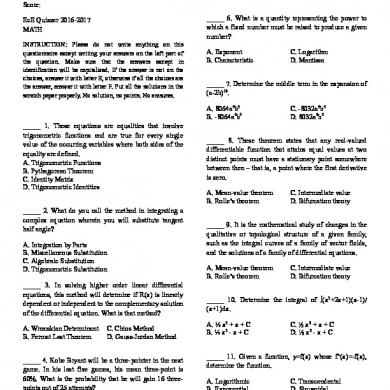How To Pass The Cpa Board Exam
This document was uploaded by user and they confirmed that they have the permission to share it. If you are author or own the copyright of this book, please report to us by using this DMCA report form. Report DMCA
Overview
Download & View How To Pass The Cpa Board Exam as PDF for free.
More details
- Words: 868
- Pages: 4
Loading documents preview...
How to Pass the CPA Board Exam: TOP 10 TIPS! Without a doubt, passing the Licensure Exam for CPA (Certified Public Accountants)requires tons of preparation, hard work, persistence, confidence, and determination, among others. You will surely do your part. You will study long hours, read a lot of books, and answer hundreds of pages of reviewers and sample exams. It probably would help as well to get tips from those who already passed the CPA Exam. This is why we prepared for you a collection of the best insights and tips we found about passing the CPA Boards — straight from those who already took and passed the exam themselves!
Check out and adopt these 10 tips to help you ace that upcoming Licensure Exam! Top 10 Tips to Pass the CPA Board Exam 1. Develop a suitable study habit.
“Each one of us has different studying styles and you should try to know which methods and techniques work best for you. What works for someone else may not work in the same way for you so it is better to first understand yourself and experiment on possible alternatives until you find your ideal study habit. The next step is to consistently apply your study habit because it helps your brain commit to it. It will ease up the learning process because your brain will know when it should focus. Of course you can tweak your study habit from time to time based on your need, but you should not change the factors that make it effective for you. Take note that there are several factors affecting study habits:
Interests/ hobbies – incorporate them in your mnemonics, keywords, and other means of associations Environment – choose a quiet environment if introvert, study with friends if extrovert Time of day – set study time when your brain is more active Ability to focus – if you have a short attention span, try the “Pomodoro technique” (that is, breaking down work into intervals, traditionally 25 minutes in length, separated by short breaks” Priorities – set your priorities first so that you know what to let go when time is not enough Other external factors – manage them so that they will not interfere when you have to study”
– From Ariel Joseph Nipas (October 2016 CPALE Top 3)
2. Being a CPA starts in the mind.
“Start thinking that you are a CPA and you are a great person. Yes, you are! Being a CPA is not a know-it-all stuff. So if you haven’t gone through some topics yet, that’s fine! Stop cramming. Stop blaming yourself. Stop doubting that you’ll pass. Stop worrying. Start claiming. Start telling yourself “congratulations CPA!”. Start empowering fellow takers. Start thanking the Lord for passing. It’s normal that some of what others know, you don’t. But what you know is enough to nail it. 🙂 Practical tips: 1. Pray before taking the exam. 2. Declare that you will pass it. 3. Read the question first, so you would know how to come up with your solution. 4. Eliminate choices for higher chances of passing. 5. Trust your final answer. 6. Double-check after all questions have been answered. 7. Make sure to allot time to answer all questions. Do not consume so much
time over the other questions. 8. After taking the subject, SMILE and FORGET.”
– From Patrick Naelgas
3. Tips how to study Financial Accounting:
Know the definitions of terms used for a certain topic. It will help you understand the chapter easily. Scan the end-of-chapter questions, to see what is asked and how it is asked. FinAcc concepts have few subtopics: o (a) recognition criteria, or when to record and recognize a transaction; o (b) measurement criteria, or what amount will be used to record the transaction, this has two parts – initial measurement, and subsequent measurement or valuation; and o (c) presentation and disclosure – which includes composition type of problems.
It’s advisable to study the theory part first. Read the Theory of Accounts (TOA) of Valix Question & Answer Portion, take down notes, or better yet, make a concept map out of your understanding, then answer the MQC in Valix’s TOA. After the conceptual understanding, solve Valix’s “Practical Accounting 1” that has a lot of common MCQ questions with his textbooks. Solve and figure out why your answer is different from the given solution. Every mistake means only one of three things: (1) carelessness in solving, (2) poor reading comprehension, (3) misunderstanding of the concepts. Learn from your mistakes, update your notes, and practice, practice, practice for mastery. – From Hilario Tan
4. Eliminate the wrong answers.
“Use the mathematical probability to your advantage. Instead of finding the correct answer, eliminate the wrong answers. In a multiple choice with 5 options, eliminating 1 to 3 “wrong answers” improves your chances of getting the answer by 20%-25%-33%-50%. Of course, do your best not to eliminate the CORRECT answer!” – From Rizaldy Menor
5. Don’t worry about the school you graduated from.
“Wala yan sa school or prof. Pagdating mo ng review school, karamihan sa mga students halos wala pa din alam. Why? https://www.pinoymoneytalk.com/prcgov/10-tips-how-to-pass-cpa-board-exam/
Check out and adopt these 10 tips to help you ace that upcoming Licensure Exam! Top 10 Tips to Pass the CPA Board Exam 1. Develop a suitable study habit.
“Each one of us has different studying styles and you should try to know which methods and techniques work best for you. What works for someone else may not work in the same way for you so it is better to first understand yourself and experiment on possible alternatives until you find your ideal study habit. The next step is to consistently apply your study habit because it helps your brain commit to it. It will ease up the learning process because your brain will know when it should focus. Of course you can tweak your study habit from time to time based on your need, but you should not change the factors that make it effective for you. Take note that there are several factors affecting study habits:
Interests/ hobbies – incorporate them in your mnemonics, keywords, and other means of associations Environment – choose a quiet environment if introvert, study with friends if extrovert Time of day – set study time when your brain is more active Ability to focus – if you have a short attention span, try the “Pomodoro technique” (that is, breaking down work into intervals, traditionally 25 minutes in length, separated by short breaks” Priorities – set your priorities first so that you know what to let go when time is not enough Other external factors – manage them so that they will not interfere when you have to study”
– From Ariel Joseph Nipas (October 2016 CPALE Top 3)
2. Being a CPA starts in the mind.
“Start thinking that you are a CPA and you are a great person. Yes, you are! Being a CPA is not a know-it-all stuff. So if you haven’t gone through some topics yet, that’s fine! Stop cramming. Stop blaming yourself. Stop doubting that you’ll pass. Stop worrying. Start claiming. Start telling yourself “congratulations CPA!”. Start empowering fellow takers. Start thanking the Lord for passing. It’s normal that some of what others know, you don’t. But what you know is enough to nail it. 🙂 Practical tips: 1. Pray before taking the exam. 2. Declare that you will pass it. 3. Read the question first, so you would know how to come up with your solution. 4. Eliminate choices for higher chances of passing. 5. Trust your final answer. 6. Double-check after all questions have been answered. 7. Make sure to allot time to answer all questions. Do not consume so much
time over the other questions. 8. After taking the subject, SMILE and FORGET.”
– From Patrick Naelgas
3. Tips how to study Financial Accounting:
Know the definitions of terms used for a certain topic. It will help you understand the chapter easily. Scan the end-of-chapter questions, to see what is asked and how it is asked. FinAcc concepts have few subtopics: o (a) recognition criteria, or when to record and recognize a transaction; o (b) measurement criteria, or what amount will be used to record the transaction, this has two parts – initial measurement, and subsequent measurement or valuation; and o (c) presentation and disclosure – which includes composition type of problems.
It’s advisable to study the theory part first. Read the Theory of Accounts (TOA) of Valix Question & Answer Portion, take down notes, or better yet, make a concept map out of your understanding, then answer the MQC in Valix’s TOA. After the conceptual understanding, solve Valix’s “Practical Accounting 1” that has a lot of common MCQ questions with his textbooks. Solve and figure out why your answer is different from the given solution. Every mistake means only one of three things: (1) carelessness in solving, (2) poor reading comprehension, (3) misunderstanding of the concepts. Learn from your mistakes, update your notes, and practice, practice, practice for mastery. – From Hilario Tan
4. Eliminate the wrong answers.
“Use the mathematical probability to your advantage. Instead of finding the correct answer, eliminate the wrong answers. In a multiple choice with 5 options, eliminating 1 to 3 “wrong answers” improves your chances of getting the answer by 20%-25%-33%-50%. Of course, do your best not to eliminate the CORRECT answer!” – From Rizaldy Menor
5. Don’t worry about the school you graduated from.
“Wala yan sa school or prof. Pagdating mo ng review school, karamihan sa mga students halos wala pa din alam. Why? https://www.pinoymoneytalk.com/prcgov/10-tips-how-to-pass-cpa-board-exam/
Related Documents

How To Pass The Cpa Board Exam
February 2021 0
How To Beat The Board Exam Using Es991-plus
January 2021 4
7 Cpa Board Subjects
March 2021 0
Criminology Board Exam Reviewer
January 2021 1
Board Exam Problems
January 2021 1
Ece Math Board Exam
February 2021 1More Documents from "Juan Charles Allan"

How To Pass The Cpa Board Exam
February 2021 0
Kostya Kimlat - The Joker Game Lecture Notes 2000.pdf
January 2021 0
Kids On Brooms Digital 1.1
January 2021 0
A. Bandit - A Secret Has Two Faces Opt
January 2021 0
